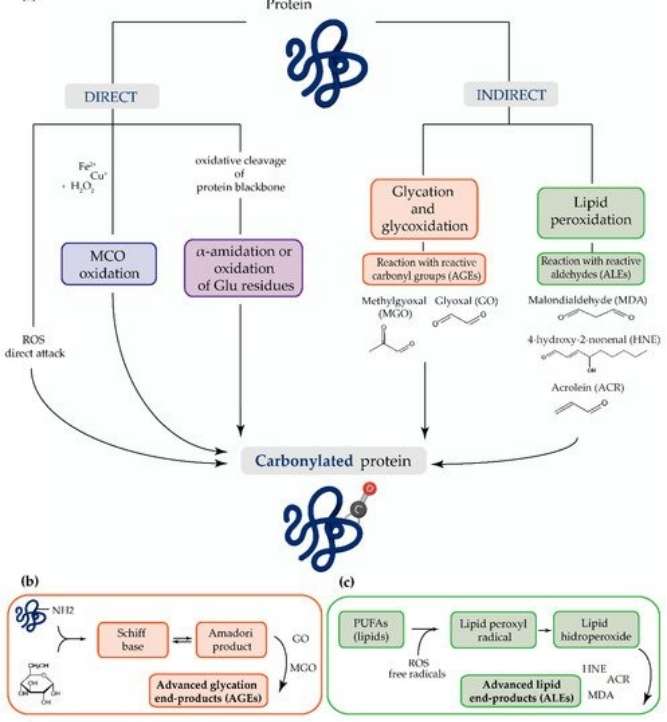
- Home
- PTMs Proteomics
- Proteomics Analysis of Carbonylation
Protein carbonylation is the most important oxidative stress-induced post-translational modification (PTM), characterized by irreversibility, stability, and relatively early formation. Protein carbonylation has been reported to play an important role in coordinating various biological processes and has been associated with many diseases. With extensive experience in protein PTM analysis and an advanced platform, Creative Proteomics provides fast, reliable, and customized protein carbonylation analysis services to accelerate our client's projects, including detection, analysis, and identification of carbonylated proteins and modification sites.
Oxidative stress occurs in all organisms when the production of reactive oxygen species (ROS) severely imbalances antioxidant defenses. Oxidative stress can lead to a variety of PTMs on proteins, including sulfhydrylation, hydroxylation, carbonylation, and nitration. Among them, protein carbonylation is a common, non-enzymatic, irreversible oxidative stress-induced PTM that has attracted widespread attention. Protein carbonylation has long been well studied and considered a biomarker for measuring oxidative damage in normal and altered cell physiology. This modification of protein has been shown to affect protein function, protein folding, protein hydrolysis and cellular dysfunction, often leading to protein proteasomal degradation. As for human diseases, researchers have found high levels of protein carbonylation in a great lot kind of major diseases, especially age-related diseases, including Parkinson's disease, chronic lung disease, chronic renal failure, cataract development, and so on.
 Fig. 1 The most common
mechanisms of protein carbonylation. (Rodríguez-García, Alba, et al., 2020)
Fig. 1 The most common
mechanisms of protein carbonylation. (Rodríguez-García, Alba, et al., 2020)
Oxidative stress affects proteins and other macromolecules, and protein carbonylation is a measure of oxidative stress in biological systems. We have developed an MS-based platform to quantify protein carbonylation and identify their carbonylation sites. In addition, our platform includes ELISA, western blot (WB), two-dimensional gel electrophoresis, spectrophotometric detection, affinity enrichment, and HPLC-based methods. Depending on the type of sample, the purpose of the experimental project, and the depth of analysis, we can apply these techniques individually or in combination. Notably, we have strong expertise in protein carbonylation site prediction by computational methods. Based on a powerful and novel bioinformatics platform, we are able to help our clients achieve efficient and rapid carbonylation site identification, which provides the basis and clues for analyzing the mechanisms of physiology and disease.
Creative Proteomics is much more than a service provider of world-class protein PTM analysis. We are constantly improving our resources and expanding our services, and are committed to providing high-quality services to accelerate our customer service projects in multiple areas. We have assisted and witnessed the success of many of our partners. If you are interested in our PTM analysis service, please contact us for more details. We are always ready to assist you!
References
Our products and services are for research use only.